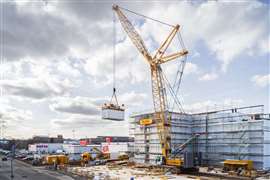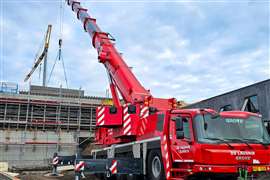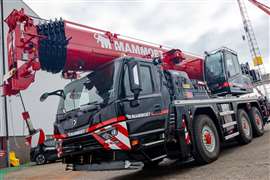Crane operator certification
01 May 2008
OSHA regulations and ASME requirements define the current qualifications for safe crane operations. The National Commission for the Certification of Crane Operators (NCCCO) is the only testing program accredited by the National Commission for Certifying Agencies. Other ofcial recognition comes from the Department of Defense, Department of Education, National Skills Standard Board and Federal OSHA as meeting OSHA and ANSI (ASME) requirements for crane operator qualifications.
The NCCCO is celebrating its 10 year anniversary and has administered more than 100,000 written exams and 30,000 practical exams. Cooperation agreements that have contributed to the success of this program are with the American Subcontractors Association, Associated General Contractors of America, Association of Union Contractors, Association of Equipment Manufacturers, International Union of Operating Engineers, Crane Manufacturers Association of America, Steel Erectors Association of America, and the group that originally formed the NCCCO as a non–proft organization in January 1995–the Specialized Carriers & Rigging Association.
An NCCCO mobile or tower crane operator certification requires written core examinations, the option of one or more of the four mobile crane written specialty examinations, and practical examinations. Candidates must be at least 18 years old and have at least 1,000 hours of crane related experience. Certified operators must also meet physical requirements and demonstrate their ability to read, write, comprehend, and exhibit arithmetic skills and load/capacity chart usage, in the language of the crane manufacturer's operation and maintenance instruction manuals. Recertification is required every five years.
Written core examinations consist of 90 multiple choice items, each specialty examination consists of 26 multiple–choice items.
Test questions include knowledge of ANSI (ASME B30.5), OSHA 1926.550, reading and understanding load charts, safe rigging principles, power line and other electrical hazards, suspended personnel platforms, hand signals, crane procedures and set–up, soil conditions, load testing requirements, wire rope inspection, daily and annual crane inspections, physical qualification requirements, and atmospheric conditions.
The practical examination comprises three mobile and one tower crane category. Th ey are lattice boom cranes, telescopic cranes of less than 17.5 tons capacity (fixed cab), telescopic cranes above 17.5 tons capacity (swing cab) and hammerhead or self–erecting tower crane. For the mobile practical examination the four main tasks are hoisting, booming, swinging and following hand signals and (multi–function) operations. The tower practical examination involves trolley travel, hoisting, swinging, and (multi–function) operations. Crane operation for all exam types is required with and without load. Candidates can lose points through operational errors or time penalties.
The NCCCO was established as a nationwide certification program to: provide a safe working environment; to reduce risk; to reduce accidents; to provide consistent training; and to expand job opportunities for operators. Many federal facilities, state agencies, and fortune 500 companies require operators to be NCCCO certified.
STAY CONNECTED


Receive the information you need when you need it through our world-leading magazines, newsletters and daily briefings.
CONNECT WITH THE TEAM











